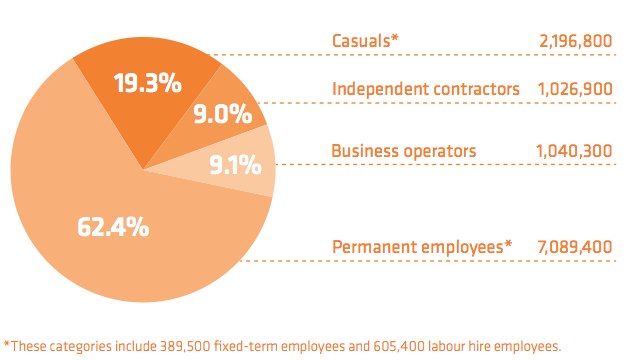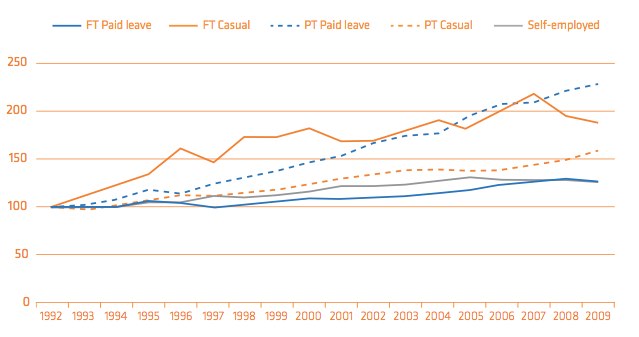Insecure work
A recent tweet from the NTEU ACT Division (@NTEUACT)
Australia has 2nd highest level of insecure work in OECD – after Spain.
We know that we are approaching 40% of the workforce undertaking insecure work.

*Source: Lives on Hold – Unlocking the potential of Australia’s workforce.
We also hear much about “skills shortages” and the need for “flexibility”, yet the “elephant-in-the-room” when it comes to REAL skills shortages is the glaring lack of wage INCREASES – if skills were not present, wages would [should] go up… but more on that later.
Leigh Hubbard also has a worthwhile article in the latest Australian Nursing Journal making the point that this issue extends well beyond the “blue collar” phenomenon and extends to schools, universities and health professionals.
This is a critical economic and social policy issue for modern economies and something that touches all levels of Australian society. Increasing stressors within modern families and the wider community should not be underestimated. We have seen the historical tensions and results of disengagement and lack of opportunity in places like Hackney in the UK, and many who live and work in suburban and rural and regional Australia will also understand the social and economic pressures of day to day life. Even something as simple as a bus-ride can suggest underlying tensions in communities that are sadly, too familiar.
We are now in a position where, more than ever before, risk [in its broadest sense] is being outsourced at EVERY point of the life cycle; schooling, education, training, health, employment housing, manufacturing. All of these endeavours are changed by the rapid and transitory flow of capital investment. Stakes are so high, the risk and rewards so great, that the ability of many “traditional” enterprises to “invest” has altered markedly.
Investment now appears transitory, patterns looking much more like speculation than investment. Within the space of one generation or less, we now see returns needed on schedules of less than a decade, sometimes less than five years, when less than a generation ago, “investments” were considered inter-generational and conversely the skills and employment opportunities grew from this base.

*Source: Lives on Hold – Unlocking the potential of Australia’s workforce.
This is no longer the case and the implications for education and training and the preparation of young people for modern labour markets has NEVER been more important. Now is the time to improve the conditions, quality and scope of our education sectors, if for no other reason, so investment in our social contract does not wane…
Research:
- Lives On Hold – Independent Inquiry in to Insecure Work [PDF]
- OECD Employment Outlook 2012
- OECD Country Note – Australia
- Growing Labour Insecurity in Australia and the UK in the Midst of Job Growth: Beware the Anglo-Saxon Model
- ACTU begin assault on insecure work [The Australian]
- Job preservation a concern for workers [Sydney Morning Herald]
- SecureJobs campaign


